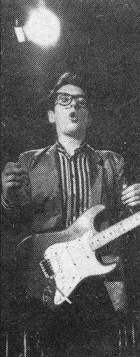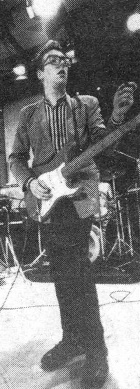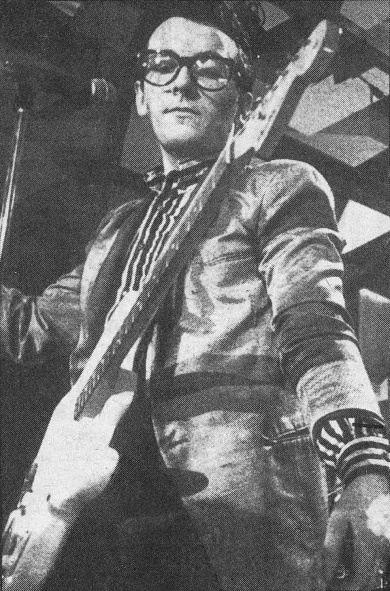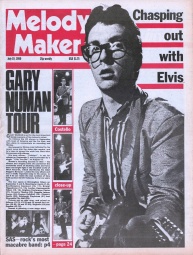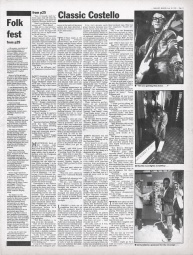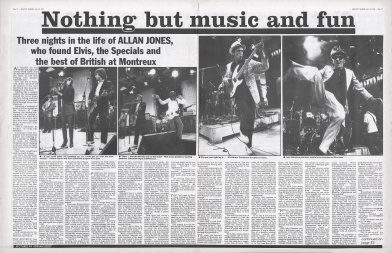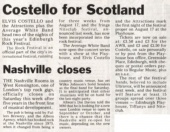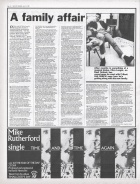Melody Maker, July 19, 1980: Difference between revisions
(formatting / update browser / de-censor 2 f-bombs) |
(change Rasher to Basher) |
||
| (11 intermediate revisions by the same user not shown) | |||
| Line 61: | Line 61: | ||
Rockpile fell sideways into "I Hear You Knocking." | Rockpile fell sideways into "I Hear You Knocking." | ||
"Oh, yes — now I ''liked'' that one," | "Oh, yes — now I ''liked'' that one," Basher beamed as Edmunds and Billy Bremner brought the number to a coruscating climax. | ||
The three of them exchanged the kind of grin that told you everything you ever needed to know about the collective personality of Rockpile. | The three of them exchanged the kind of grin that told you everything you ever needed to know about the collective personality of Rockpile. | ||
| Line 68: | Line 68: | ||
Looking a little out of condition (but don't we all at the moment, dear?), Elvis Costello declared war on Montreux with a virulence that would've shocked even his most longstanding admirers. | Looking a little out of condition (but don't we all at the moment, dear?), Elvis Costello declared war on Montreux with a virulence that would've shocked even his most longstanding admirers. | ||
[[image:1980-07-19 Melody Maker photo 01 ab.jpg|140px|right]] | |||
The movie director Sam Fuller once famously defined the cinema as a battleground. That's exactly what rock 'n' roll becomes in Costello's raging hands. Wrestling with demons most of us have only vaguely imagined, Costello doesn't just write and perform songs that are among the most literate and penetrating in the entire repertoire of rock 'n' roll, he unleashes upon his audience the darkest possible realities. | The movie director Sam Fuller once famously defined the cinema as a battleground. That's exactly what rock 'n' roll becomes in Costello's raging hands. Wrestling with demons most of us have only vaguely imagined, Costello doesn't just write and perform songs that are among the most literate and penetrating in the entire repertoire of rock 'n' roll, he unleashes upon his audience the darkest possible realities. | ||
| Line 76: | Line 77: | ||
Splicing together songs from different periods of his career ("Green Shirt" fading dynamically into "Chelsea," "Big Tears" pressing at the contours of "Secondary Modern," for instance), he created an electrifying mosaic of images and impulses. The Attractions, meanwhile, seem to scale one peak of musical empathy, only to climb another. | Splicing together songs from different periods of his career ("Green Shirt" fading dynamically into "Chelsea," "Big Tears" pressing at the contours of "Secondary Modern," for instance), he created an electrifying mosaic of images and impulses. The Attractions, meanwhile, seem to scale one peak of musical empathy, only to climb another. | ||
[[image:1980-07-19 Melody Maker photo 02 ab.jpg|140px|right]] | |||
Their collective performance on an extended "Watching The Detectives" rivalled the extraordinary dementia of, say, Neil Young's "Last Dance," from ''Time Fades Away'' (one of the all-time great moments in rock history). | Their collective performance on an extended "Watching The Detectives" rivalled the extraordinary dementia of, say, Neil Young's "Last Dance," from ''Time Fades Away'' (one of the all-time great moments in rock history). | ||
| Line 89: | Line 91: | ||
No wonder he's always on edge. It must become an intolerable burden. I wouldn't be surprised if he searches his hotel rooms for bugging devices and sleeps wearing a gag in case he starts rambling. There must be few people with whom he can feel at ease; reporters certainly aren't among their number. | No wonder he's always on edge. It must become an intolerable burden. I wouldn't be surprised if he searches his hotel rooms for bugging devices and sleeps wearing a gag in case he starts rambling. There must be few people with whom he can feel at ease; reporters certainly aren't among their number. | ||
[[image:1980-07-19 Melody Maker photo 03 ab.jpg|140px|right]] | |||
It's impossible to reassure him that you aren't going to spend all night chasing him, asking him foolhardy questions about his personal life when all you really want to do anyway is have a beer and chasp out a little. | It's impossible to reassure him that you aren't going to spend all night chasing him, asking him foolhardy questions about his personal life when all you really want to do anyway is have a beer and chasp out a little. | ||
| Line 125: | Line 128: | ||
"Not Dexy's Midnight Runners, is it?" Jake asked. | "Not Dexy's Midnight Runners, is it?" Jake asked. | ||
"Where's your tape recorder then?" Elvis Costello asked, coming | "Where's your tape recorder then?" Elvis Costello asked, coming back the other way. "Taping all this are you?" | ||
A girl appeared on stage. She was only there two minutes before she was down to a rather fetching silver G-string. Her breasts were as pert as puppies. Not that I was looking. | A girl appeared on stage. She was only there two minutes before she was down to a rather fetching silver G-string. Her breasts were as pert as puppies. Not that I was looking. | ||
| Line 155: | Line 158: | ||
{{cx}} | {{cx}} | ||
<center>Photos by [[Adrian Boot]].<br> | |||
[[image:1980-07-19 Melody Maker photo 04 ab.jpg|390px]] | |||
</center> | |||
{{Bibliography notes header}} | {{Bibliography notes header}} | ||
| Line 168: | Line 179: | ||
---- | ---- | ||
''Melody Maker'' reports EC will play the Edinburgh Rock Festival, Sunday, [[Concert 1980-08-17 Edinburgh|August 17, 1980]]. | ''Melody Maker'' reports EC will play the Edinburgh Rock Festival, Sunday, [[Concert 1980-08-17 Edinburgh|August 17, 1980]]. | ||
---- | |||
[[Ian Birch]] interviews [[Clive Langer]]. | |||
{{Bibliography images}} | {{Bibliography images}} | ||
[[image:1980-07-19 Melody Maker cover.jpg| | [[image:1980-07-19 Melody Maker cover.jpg|x255px]] | ||
[[image:1980-07-19 Melody Maker | [[image:1980-07-19 Melody Maker page 33.jpg|x255px|page 33]] | ||
<br><small>Cover and | <br><small>Cover and page scan.</small> | ||
<small>Page scans.</small><br> | |||
[[image:1980-07-19 Melody Maker pages 24-25.jpg|392px|pages 24-25]] | |||
| Line 179: | Line 197: | ||
<center><h3> Costello for Scotland </h3></center> | <center><h3> Costello for Scotland </h3></center> | ||
---- | ---- | ||
<center> | <center> Melody Maker </center> | ||
---- | ---- | ||
{{Bibliography text}} | {{Bibliography text}} | ||
| Line 191: | Line 209: | ||
Tickets are now on sale at: £3.50 and £3 for the AWB and £3 and £2.50 for Costello, on sale personally or by post from the Playhouse box office, Greenside Place, Edinburgh, with cheques or postal orders payable to Regular Music, plus an s.a.e. | Tickets are now on sale at: £3.50 and £3 for the AWB and £3 and £2.50 for Costello, on sale personally or by post from the Playhouse box office, Greenside Place, Edinburgh, with cheques or postal orders payable to Regular Music, plus an s.a.e. | ||
The rest of the festival bands, believed to include Ultravox, will be announced next week, and the festival will feature at least 15 groups spread over three venues – Edinburgh Playhouse, Tiffanys and Niteclub. | The rest of the festival bands, believed to include Ultravox, will be announced next week, and the festival will feature at least 15 groups spread over three venues – Edinburgh Playhouse, Tiffanys and Niteclub. | ||
{{cx}} | {{cx}} | ||
{{cx}} | {{cx}} | ||
[[image:1980-07-19 Melody Maker page | {{Bibliography box}} | ||
<center><h3> A family affair </h3></center> | |||
---- | |||
<center> Ian Birch </center> | |||
---- | |||
'''After months in something of a musical hiatus, Clive Langer, ex-Deaf School, has come home to roost with F-Beat. Ian Birch sees how he's getting along with his new family. | |||
{{Bibliography text}} | |||
[[image:1980-07-19 Melody Maker page 20.jpg|140px|right]] | |||
On the wall of Nick Lowe's front parlour studio in Shepherds Bush is pinned an indispensable item — for the owner, in particular. A booklet entitled "How To Play Rock Bass" is stamped with the warning, "Studio copy — please — do not remove." Could this be the real source behind all that pure pop for today's tipplers? | |||
Early morning cuppa in hand, Clive Langer listens intently to a playback of a new rhythm track. The drum sound is dizzyingly strident but, however much he might like it, Langer knows it will have to go. It doesn't fit the new feel that he's trying to formulate. | |||
"I'm a bit obsessed with swing at the moment — swing in a pub sense." (Fittingly, Paul Riley, ex-bassman with one of pub rock's first swing combos, Chilli Willi and the Red Hot Peppers, wanders in with his early morning cuppa.) "What I'd like to do with the new songs is create a live feel where you roll through a set as opposed to attacking a set. That's what I'm thinking about this week, if you know what I mean. It's partially getting a bit older — you get a bit more laid back." | |||
Langer looks as if he's finally come home to roost with the F-Beat consortium. When Radar bit the dust in a flurry of unpleasant business machinations, masterminds Andrew Lauder and Jake Riviera took matters into their own hands and set up a new Ponderosa which is something akin to ''Bonanza'' topped up with a dash of ''Dallas''. It's a family affair — you support me and I'll produce you (as long as it's finished before closing time) — currently centred on Rockpile, Costello, Lowe, Carlene Carter (Nick's wife) and, of course, Langer. | |||
Langer's involvement began last Christmas when Jake and Elvis arranged a meeting in a pub (where else?) to discuss the possibility of Clive supporting El on his small-venue, UK [[:Category:1980 UK Tour|tour]] earlier this year. Costello's interest had been aroused by a Liverpool boat trip [[Concert 1979-05-22 Liverpool|gig]] late last year when they had shared a bill, and by ''I{{nb}}Want The Whole World'', a 12-inch EP of five songs Langer released via Radar. | |||
The timing was almost God-given. After the demise of Deaf School (whose last album ''English Boys/Working Girls'' was unjustly lost in the punk obsession), he did a lot of drifting and a lot of drinking until Radar appeared. Through their auspices, he tried his hand everywhichway. | |||
He produced Liverpool comrades like the Yachts ("Look Back In Love" plus "Yachting Types") and Bette Bright ("My Boyfriend's Back" and "Captain Of Your Ship") as well as four cuts in TW studios by an outfit called Radio Earth who have since evolved into Comsat Angels. | |||
He took to the stage, playing in Bright's back-up band the Illuminations who were a chummy mishmash of Yachts, Deaf School and Rich Kids. He acted as talent scout and picked up on Madness many months before they became the Eighties' Monkees. It was this link that led to him producing their debut album, ''One Step Beyond'', in mid-'79. | |||
He worked on his own material with the Boxes' a loose-knit outfit who, for the EP included Budgie (formerly of Big In Japan and now a Banshee) on "drums and average bass" and Ben Barson on "pyrotechnic keyboards." Lack of finances made it such a casual set-up that they played only four gigs throughout '79. The Boxes have now consolidated around Barson bassist James Eller who came via an ''MM'' classified and co-writes often with Langer plus drummer Martin Hughes, who was once part of Gary Holton's Gems. | |||
So, prior to the Christmas meeting, Langer was manager-less, had the "sort of agent who never got us a gig!" and a new shaky deal with Sire/Korova who weren't too keen on a band album but would have been interested in a solo effort. "I think I did actually sign something but I don't know what happened to it. I did sign a piece of paper but it never got to them." | |||
Riviera stepped into the breach. He offered management only if Langer joined F-Beat. That was agreed. "Still, contracts with Jake are a bit meaningless. We know that if we're not getting on, we just won't bother. I don't know what the situation is if we don't sell any records at all. But luckily, there's other ways for him to earn money out of us all — not that it's just based on that." How much is it based on that, then? "Less than with other people, certainly." | |||
The band supported Elvis during that mammoth trek of deliberately unfashionable towns and, when that finished, promptly did the same for Madness. It was a hard three month stretch but it did have its beneficial sides. "It's exciting playing in front of people. It's a challenge — me pushing me further than is comfortable. I needed a vehicle to do that and I find it frightening because I don't know what's going to happen when we go on. I've done some pretty weird things which have surprised me." | |||
Give us an example. "At our last gig some really close friends started jumping up and down after just a couple of numbers. The rest of the audience didn't know what was going on and didn't seem to be enjoying it. My friends began to really annoy me and all of a sudden I freaked out. I didn't want to see them there and I told them all to get out — pretty bluntly ... Their faces looked really shocked. Things like that happen on stage." It beats Est anyday as a path to self-discovery. | |||
The "road" also gave him new vocal awareness. His singing — a kind of geezer-next-door, reedy spring — is undoubtedly one of the weakest points on his ''Splash'' album which was released last week. | |||
"Touring teaches you how to ''sing'' songs. You learn how to deal with them. Of course, my voice worries me when people remind me about it. It worried me on the Elvis tour because there was another voice there. On the Madness tour, it didn't matter that much because no-one else could sing that well — there it was just a matter of putting songs across. | |||
"I think playing live depends on confidence. If you get some sort of success or someone bucks you up, then you go on and you're really good. But if you go on and you've just had a bad review of the single for the second week running, it puts you off." | |||
Does the press affect you that much? "Sort of ... I try not to let it because with Deaf School we had so much bad press that everyone got hung up about it. But it does ... sometimes I can laugh it off ..." By the end of the interview, the wriggling ambiguity was on the way to being resolved. | |||
"I'm always interested in what people are really like. That's why the press don't bother me that much because they write about what things ''should'' be like rather than what they are like. | |||
And anyhow, simply joining F-Beat has put Langer instantly under a new and pretty bright spotlight. However much Riviera, Lowe, Costello and the crew try to demolish the elitist traditions of rock 'n' roll, especially in their attitude towards the press, their aggressive independence and "wacko" antics have the kind of style that attracts trilbies (and myth-makers) like flies. From another angle, it's called manipulation. | |||
Did Langer feel intimidated by the "stature" of his label mates? "I was sort of out of action for a year and I used to see Elvis and think, I could do that on stage. Then being there and doing it, I was just amazed at how great his talent was. So I suppose at times that was intimidating but I don't feel jealousy. Sometimes I feel depressed that I can't sing like that or write words like that. <!-- suppress duplicated text from two paragraphs back: but than what things ''should'' be like rather than what they are like. --> | |||
"Also, there's a certain sense of humour. Being on the road with it you catch it pretty fast. On the road, we're like the new boys but we still know what goes on. We do get treated like the ones who aren't stars!" | |||
Does that mean the Justina red is served in plastic cups rather than glasses? Or what? "In the dressing rooms, obviously, the support band gets a few cans of lager and the head band two bottles of vodka, four bottles of French wine and all that. But we go in and nick it. Sometimes we get into trouble if we nick too much. You do need to have a lot of order in an on-the-road situation." | |||
But isn't there a possible conflict between your personal aims and the F-Beat house style which is as powerfully evident in everything from the artwork (regenerated Woolworths tack from the Sixties) to the production techniques (variations on Basher's infamous "bash-it-down-and-tart-it-up" attack). | |||
"To a certain extent this is a period of sussing it out. I would have done things differently had I not been on F-Beat. But then there are certain things that I've always admired about it and those people anyway. It's been about six months now and we're beginning to find our place — when to argue or when to say okay. I suppose at the beginning I was just pleased to have a manager and there weren't any other managers that I wanted. | |||
Another possible source of conflict is between all the different roles Clive is attempting — as producer, songwriter and performer. He takes the point. "My songwriting definitely suffers because I don't have much time to write. Also being involved with music all the time means that they might become a bit boring compared to someone who's just sitting in his front room all day long. Plus I'm quite slow." | |||
He dislikes producing himself because the idea of a new perspective or a fresh outlook which could make all the difference in the world (and charts) becomes that more difficult. | |||
"You lack someone between the machinery and the band. I'm quite happy to have someone say, do this or do that, whereas doing it for someone else is easy. Hopefully, I'd be like a fan in the studio and make the sound how I'd like to hear it." | |||
Which is exactly what he did, first with the "Prince" single and then ''One Step Beyond''. Interestingly, for the single, Madness got together £60 to pay for Pathway studios but the then drummer to whom the money had been entrusted absconded. So Langer went to Rob Dickins, vice-president of Warners music and a perennial champion of the Liverpool contingent especially, who lent him £200. They made the demos and you know what happened then. | |||
"I like pop records, production-wise. I try not to get too frightened about what's currently fashionable. Like with Madness, it was trying to catch them live and the humour and what was in the songs and then making them into pop songs as opposed to just leaving it as a 'recorded live sound.' The Kilburns' albums were always a disappointment to me because they didn't sound good enough on the record player and yet they were really good live." | |||
Langer often teams up with Alan Winstanley, a producer in his own right. They normally work well together because Alan's technical expertise and extraordinary ear offsets Clive's more intuitive approach. However, on ''Splash'' the alchemy hasn't gelled. The album was recorded — or rather slotted in during spare moments — over the last nine months, and had three different sets of producers. | |||
He wanted to re-record but the budget wouldn't let him. Still, the next one should be more under control. And the immediate future doesn't look too bad. Langer starts the second Madness album in a week or so while the Boxes should be playing behind — guess who? — Carlene Carter on some forthcoming gigs. He also hopes that in the autumn they can get together a "revue" of sorts with Bette Bright and a brass section. His outlook here is entirely realistic: not only would it be more fun to do it with friends but also no single act would be able to pull that many people. | |||
The family that plays together, stays solvent together. | |||
{{cx}} | |||
{{cx}} | |||
{{Bibliography notes footer}} | {{Bibliography notes footer}} | ||
Latest revision as of 14:25, 5 August 2023
|

